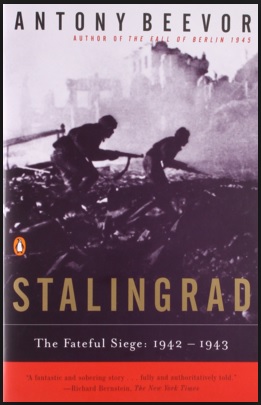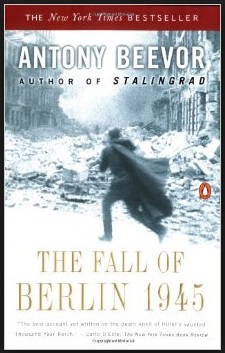Friends,
I hope this post finds you well and ready to tackle another week! I’ve decided to start writing some themed posts to mix up the regular ones that you read, and today’s post is the first. Let’s get down to it…
Five of My Favorite Books
I’ve read quite a few books in my time, and there will be plenty more to come. However, a handful stick out to me as my favorites, for various reasons, and I’d like to share those with you today. If you’ve read any of these and would like to discuss with me, I’d love to connect with you in that way. If you haven’t read them, then perhaps you’ll check them out if they interest you!
The first book (though not necessarily the most favorite of the bunch) is Stalingrad by Antony Beevor. I read this book in college, in the middle of my initial draw to WWII, and immediately saw the events in the book as part of a very real conflict. The way Beevor describes things – people, places, conversations and accounts – helps put the most significant event on the Eastern Front (and possibly in the whole war) into an understandable and believable perspective. It definitely helped me better comprehend the vast quantity of Soviet troops involved, the efficient tactics of the advancing Germans, and the ideological struggle between the two that manifested itself in the bloodshed at Stalin’s city. This was a very memorable read!

The second book on my list was also written by Beevor, and is essentially a sequel to Stalingrad. It’s entitled The Fall of Berlin 1945 and recounts the Soviet advance from Stalingrad to Berlin, ending with the eventual fall of the Nazi capital in 1945. What stuck out to me while reading this was the vivid descriptions of the skirmishes and battles the Soviets fought en route to Germany, as well as the defense put up by the retreating Wehrmacht. One line I remember from the book was a description of the artillery guns on the Soviet side. During an artillery barrage on the way to Berlin, there was an instance where there was a Soviet artillery piece (of one form or another) about every 4 meters along the breakthrough sector. Due to the sheer volume and pressure of the artillery, the gunner “had to remember to keep their mouths open to equalize the pressure on their ears.” That’s an incredible thing to think about – something so grand and booming that you have to physically change your behavior around it. This is a great read for anyone interested in the fall of the Third Reich.

The third book on my list is a Cold War book and a memoir. Spymaster by Oleg Kalugin is an account of a KGB general and his experience fighting the secret war against the West, most notably the United States. His story interested me because 1) I had never before read anything like it – memoir or not – and 2) it provides a very unique window into a world that was for so long very secretive and foggy. Getting an inside perspective of the KGB and its views of capitalism, America, and our ideology was very enlightening.

The fourth book on today’s list is Ten Fighter Boys, which is a compilation of wartime accounts by fighter pilots in the Royal Air Force. These pilots flew many missions and sorties, all for the protection of Britain and the prolonging of the conflict. One of them decided it would be a good idea for the boys to write down their accounts of these sorties right after they land, so it’s fresh in their memories. With this being the case, I got a really accurate and clear look into what pilots faced in their position. In fact, this book helped give inspiration when I wrote Unguarded, my second book and a story about a London boy who is affected by the Blitz. It was a very interesting and unique look into something so familiar yet something I knew almost nothing about.

The final book on my list today is The Napoleonic Wars by Gunther Rothenberg. This was another book I read in college, for an upper level history class. I thoroughly enjoyed it as there were great descriptions of battles, tactics, and behind-the-scenes politics surrounding Napoleon. A good deal of clear illustrations accompanied the text, which really brought the account of Napoleon’s victories and final defeat to life. Before this, I was never really interested in Napoleonic history, but this read changed me. It’s actually inspired me to (somewhat) consider using Napoleon as part of my master’s dissertation research down the road.

Well, that does it for this list of favorite books. I hope you enjoyed it! Like I said before, if you’ve read any of these I’d love to connect and talk about them with you. And if you haven’t, then hopefully I’ve introduced you to a new read that you might pick up and enjoy.
In next week’s post, I’ll resume talking about my writing life and how things are going on the home front. Have a wonderful week, and good luck in your quest to accomplish whatever goals you’ve set for yourself.
Until next time,
-Eli